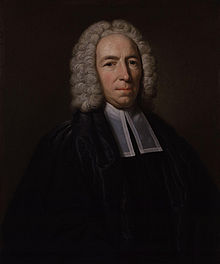Conyers Middleton
| Conyers Middleton | |
|---|---|

A 1746 portrait of Conyers Middleton by John Giles Eccardt
|
|
| Born |
27 December 1683 Richmond, North Yorkshire |
| Died | 28 June 1750 (aged 66) Hildersham, Cambridgeshire |
| Resting place | St. Michael's Church, Cambridge |
| Nationality | English |
| Alma mater | Trinity College, Cambridge |
| Occupation | Clergyman and author |
| Notable work | Life of Cicero (1741) |
| Spouse(s) |
|
Conyers Middleton (27 December 1683 – 28 July 1750) was an English clergyman. Mired in controversy and disputes, he was also considered one of the best stylists in English of his time.
Middleton was born at Richmond, North Yorkshire in 1683. His mother, Barbara Place (d. 1700) was the second wife of William Middleton (c.1646–1714), the rector of Hinderwell. Conyers Middleton had two brothers and a half-brother.
Middleton was educated at The Minster School, York before entering Trinity College, Cambridge in March 1699. He graduated with a BA in 1703. He was elected a fellow of the college in 1705 and took his MA in 1706 In 1707 he was ordained a deacon, and a priest in 1708.
In 1710 Dr. Middleton married Sarah Morris, the daughter of Thomas Morris (died 1717) of Mount Morris, Monks Horton, Hythe, Kent, and widow of Councillor and recorder Robert Drake of Cambridge (died 1702), of the family Drake of Ash. In due course Elizabeth Montagu (1718-1800) became a step-grand-daughter.
Middleton was one of the thirty fellows of Trinity College who on 6 February 1710 petitioned the Bishop of Ely, as visitor of the college, to take steps against Richard Bentley the Master, at odds with the fellowship. In 1717, he became involved in a dispute with Bentley over the awarding of degrees. George I visited the university, and the degree of Doctor of Divinity was conferred on 32 people, including Middleton. Bentley, as regius professor of divinity, demanded a fee of four guineas from each of the new doctors in addition to the established complimentary "". Middleton, after some dispute, consented to pay, taking Bentley's written promise to return the money if the claim should be finally disallowed. He was then created doctor. Having vainly applied for a return of the fee, he sued for it as a debt in the vice-chancellor's court. After various delays and attempts to make up the quarrel, the vice-chancellor issued a decree (23 September 1718) for Bentley's arrest. Bentley's refusal to submit to this decree led to further proceedings, and to his degradation from all his degrees by a grace of the senate on 18 October.
...
Wikipedia
